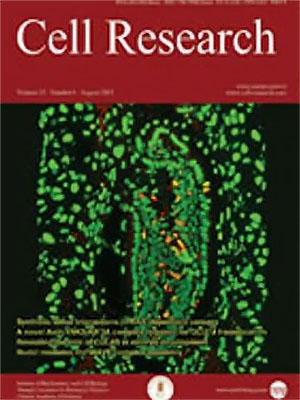
Volume 13, No 5, Oct 2003
ISSN: 1001-0602
EISSN: 1748-7838 2018
impact factor 17.848*
(Clarivate Analytics, 2019)
Volume 13 Issue 5, October 2003: 319-333
ORIGINAL ARTICLES
Methylation profiling of twenty four genes and the concordant methylation behaviours of nineteen genes that may contribute to hepatocellular carcinogenesis
Jian YU1*, Hong Yu ZHANG1*, Zhen Zhong MA1, Wei LU 2, Yi Fei WANG 2, JingDe ZHU1**
1The State-Key Laboratory for Oncogenes and Related Genes, Shanghai Cancer Institute, Shanghai
Jiaotong University, LN 2200/25, Xietu Road, Shanghai 200032, China E-mail: zhujingde@yahoo.com
2Department of Mathematics, Shanghai University, No. 99, Shangda Road, Shanghai 200436, China
* Both authors contribute equally to this work.
Correspondence: Jing De ZHU(zhujingde@21cn.com or zhujingde@yahoo.com)
To determine the possible role of the epigenetic mechanisms in carcinogenesis of the hepatocellular carcinoma, we methylation-profiled the promoter CpG islands of twenty four genes both in HCC tumors and the neighboring non-cancerous tissues of twenty eight patients using the methylation-specific PCR (MSP) method in conjunction with the DNA sequencing. In comparison with the normal liver tissues from the healthy donors, it was found that while remained unmethylated the ABL, CAV, EPO, GATA3, LKB1, NEP, NFL, NIS and p27KIP1 genes, varying extents of the HCC specific hypermethylation were found associated with the ABO, AR, CSPG2, cyclin a1, DBCCR1, GALR2, IRF7, MGMT, MT1A, MYOD1, OCT6, p57KIP2, p73, WT1 genes, and demethylation with the MAGEA1 gene, respectively. Judged by whether the hypermethylated occurred in HCC more frequently than in their neighboring normal tissues, the hypermethylation status of the AR, DBCCR1, IRF7, OCT6, and p73 genes was considered as the event specific to the late stage, while that the rest that lacked such a distinguished contrast, as the event specific to the early stage of HCC carcinogenesis. Among all the clinical pathological parameters tested for the association with, the hypermethylation of the cyclin a1 gene was more prevalent in the non-cirrhosis group (P=0.021) while the hypermethylated p16INK4a gene was more common in the cirrhosis group (P=0.017). The concordant methylation behaviors of nineteen genes, including the four previously studied and their association with cirrhosis has been evaluated by the best subgroup selection method. The data presented in this report would enable us to shape our understanding of the mechanisms for the HCC specific loss of the epigenetic stability of the genome, as well as the strategy of developing the novel robust methylation based diagnostic and prognostic tools.
FULL TEXT | PDF
Browse 2164


